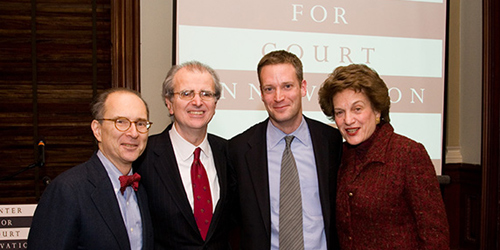Sample Documents
Article
Sample Documents
Below are a number of sample documents—everything from consent forms and intake assessments to program descriptions and brochures—used every day by problem-solving initiatives around the country. These may be helpful for your program as guides or templates. If your program uses a tool that might be helpful to include on this list, please email expertassistance@courtinnovation.org.
Agendas – Problem-Solving ConferencesIdaho-2008 Drug and Mental Health Court Institute Agenda: Indiana Problem-Solving Courts Workshop 2008Charters and BylawsSeattle Municipal Court, Community Court CharterCompliance Tracking ToolsSouth Carolina Fourth Judicial Circuit, Community Service Time Sheet Community Engagement – Events FlyersSan Diego’s Beach Area Community Court, Planning Committee Meeting Flyer San Francisco Community Justice Center Kick-off Town Hall MeetingCommunity Engagement – Meeting AgendasSouth Carolina Fourth, Community Forum Agenda Judicial CircuitCommunity Engagement – Engaging VolunteersMidtown Community Court, Volunteer OpportunitiesSan Diego’s Beach Area Community Court, Volunteer ApplicationCommunity Engagement – Meeting ToolsSan Diego’s Beach Area Community Court Ambassadors Program, Meeting Notes (for keeping records of planning meetings)San Diego’s Beach Area Community Court Ambassadors Program, Venue List (for gathering information on possible meeting locations)Community Justice Strategic PlansTarrant County (Ft. Worth) TX Community Justice Strategic PlanCommunity SurveysLynchburg Community Court, Community SurveySan Francisco Community Justice Baseline Survey 2009San Francisco Community Justice Press ReleaseSouth Carolina Fourth Judicial Circuit, Community SurveyConsent FormsSouth Carolina Fourth Judicial Circuit, Victim Consent FormSouth Carolina Fourth Judicial Circuit, Officer’s Consent FormExpungement InformationSouth Carolina Fourth Judicial Circuit, Fact Sheet on Expunging Records“Good Neighbor” AgreementsSeattle, Sample Community Good Neighbor Agreement Intake AssessmentsBronx Community Solutions, Intake Assessment FormClackamas County Social Services, Community Court Intake/QuestionnaireLynchburg Community Court, Intake Assessment FormSouth Carolina Fourth Judicial Circuit, Pretrial Intake AssessmentLinkage Agreements/Memoranda of UnderstandingPima County AZ Juvenile Domestic Violence Project, Memorandum of AgreementCareSouth Carolina and South Carolina Fourth Judicial Circuit, Linkage AgreementSan Diego Downtown Community Court Pilot Program, Memorandum of UnderstandingNewslettersBronx Community Solutions, Fall 2009 NewsletterCommunity Justice Devon and Cornwall - December 2008 Hartford Community Court, Fall 2007 NewsletterPhiladelphia Community Court, Winter 2006-2007 NewsletterSan Diego’s Downtown Community Court, Inaugural NewsletterSeattle Community Court, Summer 2008 Newsletter Seattle Community Court, Summer 2009 Newsletter
Operations ManualsDC Misdemeanor and Traffic Community Court, Program Manual of Policies and ProceduresEast of the River Community Court, Program Manual of Policies and ProceduresPhilladelphia's Community Court, Manual -- Table of ContentsPretrial NoticesSouth Carolina Fourth Judicial Circuit, Program Requirements Explanation FormSouth Carolina Fourth Judicial Circuit, Participant Account NoticeSouth Carolina Fourth Judicial Circuit, Delinquent Payment NoticeSouth Carolina Fourth Judicial Circuit, Termination NoticeProgram DescriptionsBronx Community SolutionsCommunity Prosecution in West Midlands, EnglandIndianapolis Community Court - Program Description FlyerMelbourne's Neighbourhood Justice CentrePhiladelphia Community Court, Program DescriptionPima County AZ Juvenile Domestic Violence Project, Program DescriptionSan Diego’s Beach Area Community Court, General Information Flyer San Diego Collaborative and Restorative Justice Court ProgramsSan Diego, Mid-City Community Court Mission Statement San Diego Serial Inebriate Seattle Community Court, Council BriefingSouth Carolina Fourth Judicial Circuit Chesterfield County Drug Court South Carolina Fourth Judicial Circuit Operation Community JusticeSouth Carolina Fourth Judicial Circuit Alcohol InterventionWashington DC's East of the River Community Court Washington DC's Misdemeanor and Traffic CourtProgram ReportsBronx Community Solutions, Annual ReportBronx Community Solutions, Quarterly Report San Diego’s Mid-City Community Court, Quarterly Report Fact SheetSeattle Community Court, Annual Report Referral FormsSouth Carolina Fourth Judicial Circuit, Pretrial Intervention Program Referral Form Survey ToolsSan Diego’s Beach Area Community Court, Survey Form for Community Impact PanelistsSan Diego’s Beach Area Community Court, Survey Form for OffendersSan Diego’s Beach Area Community Court, Summary of Survey of Community Impact Panelists
Training CurriculaAtlanta Community Court - Police Training Curriculum


